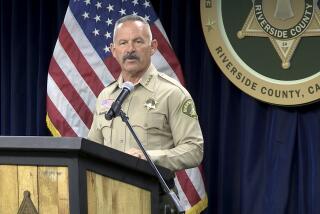Board Bans Hiring Smoking Deputies
- Share via
Hoping to stem escalating insurance costs, Riverside County has banned the hiring of sheriff’s deputies who smoke and may expand the prohibition to all hires in county government.
Riverside County is the latest in a growing number of municipalities across the nation to hire only nonsmokers, arguing that they are less likely to get cancer, heart disease and other ailments linked to tobacco.
Most of the bans focus on law enforcement officers and firefighters who receive the most generous insurance and workers’ compensation coverage because of their potentially dangerous jobs.
Riverside County’s decision this week has raised concerns from civil libertarians.
Some question how the county will enforce the rules, while others say the smoking ban could be the first step in barring employment for people who partake in other potentially unhealthful behaviors, such as overeating and excessive drinking.
“A government agency cannot regulate what a person does at home as long as it’s legal, and to my knowledge, smoking is still legal,” said Ramona Ripston, executive director of the American Civil Liberties Union of Southern California. “This is still America.”
The proposal came up at a Riverside County Board of Supervisors meeting Tuesday, as the head of human resources described escalating workers’ compensation and disability costs.
The county is expected spend $35 million on workers’ compensation claims next year and be required to hold $88 million in a reserve fund. This year, the county is expected to spend $32.4 million in direct costs and have $59 million in reserves.
Much of that money is spent on public-safety personnel, who under state law receive a special slate of benefits. Certain conditions, such as heart problems, cancer, pneumonia and back trouble, are presumed to be caused by the stresses of the job, and will automatically be covered by workers’ compensation and disability insurance.
For example, a sheriff’s deputy who has a heart attack and becomes disabled would receive medical expenses plus a minimum of half of the salary for life, even if smoking was a contributing factor.
“Since taxpayers must pay the cost of these presumed conditions, in terms of worker comp benefits and disability requirements, we are seeking to control it as much as humanly possible,” said Ron Komers, director of human resources.
Riverside County is one of several localities to prohibit the hiring of smokers. Ventura County sheriff’s deputies agreed to the ban in a labor pact approved in 1988, and Los Angeles city firefighters agreed to it a year earlier.
On the Internet, many help-wanted ads for police officers across the nation include not smoking as a requirement, next to a high-school diploma and a driver’s license.
With the rules have come controversy. This year, Fall River, Mass., Officer Wayne H. Jeffrey was fired after an anonymous letter turned him in for smoking while off-duty at a party.
The Massachusetts Supreme Court has said such actions are legal.
Courts also have upheld smoker bans for government jobs outside of law enforcement. The U.S. Supreme Court upheld a Florida ruling denying employment to a smoker who wanted to work as a clerk in North Miami.
Ripston said the ACLU would need to learn more about the situation before deciding whether to get involved.
If such laws are allowed to stand, she asked whether there is anything that would stop an agency from going further, such as banning the hiring of workers who eat red meat.
Riverside County officials said they will closely monitor the public-safety ban, and if it is successful, they will consider extending it to all new hires.
“Personally, I hate cigarettes. I feel if you’re going to do it, you ought to do it across the board,” said Board of Supervisors Chairman and former smoker John Tavaglione.
But during the hearing, it became clear that figuring out how to enforce the rules will be a delicate task.
County Administrator Larry Parrish asked dryly: “The odd cigar, I take it, would be exempt?”
More to Read
Sign up for Essential California
The most important California stories and recommendations in your inbox every morning.
You may occasionally receive promotional content from the Los Angeles Times.














